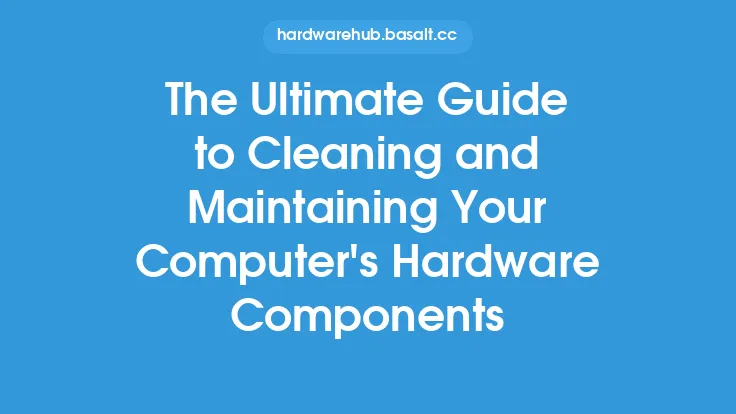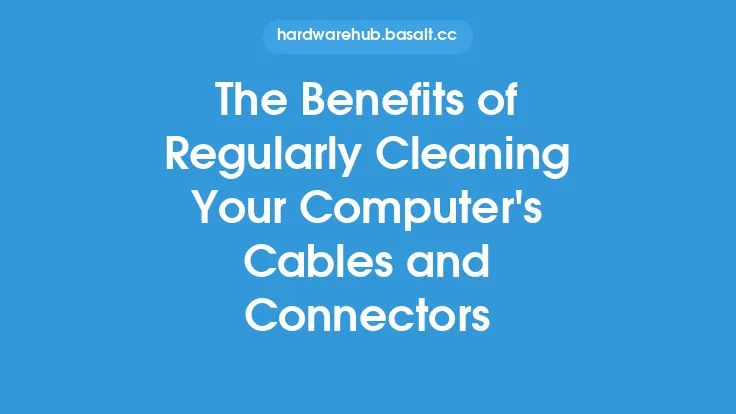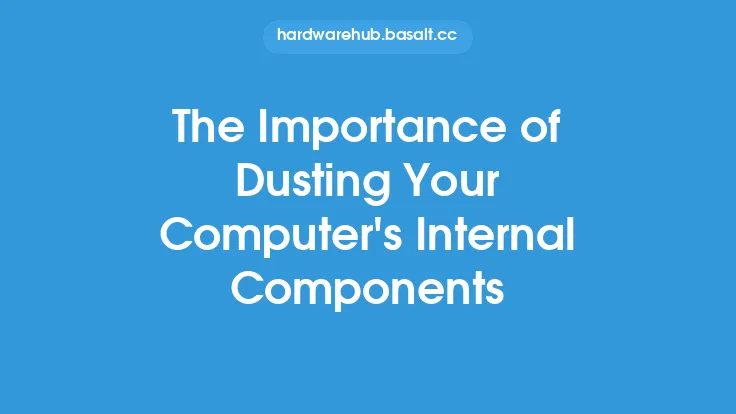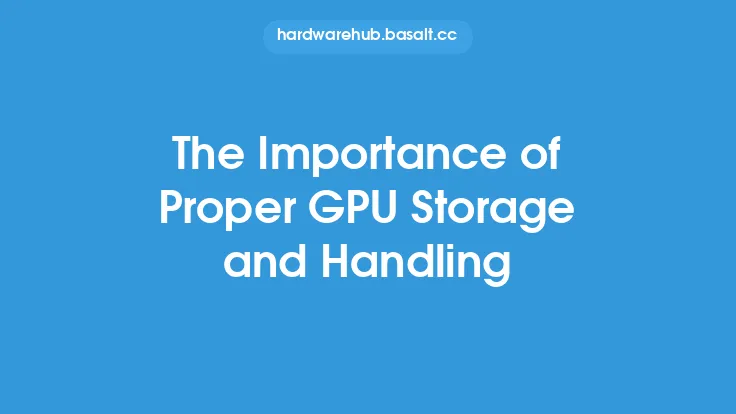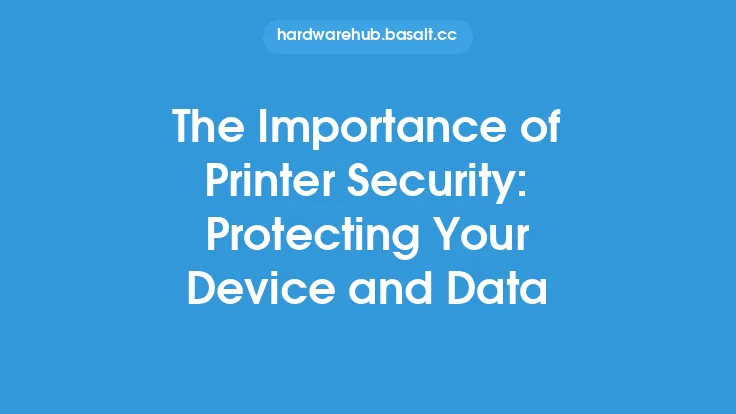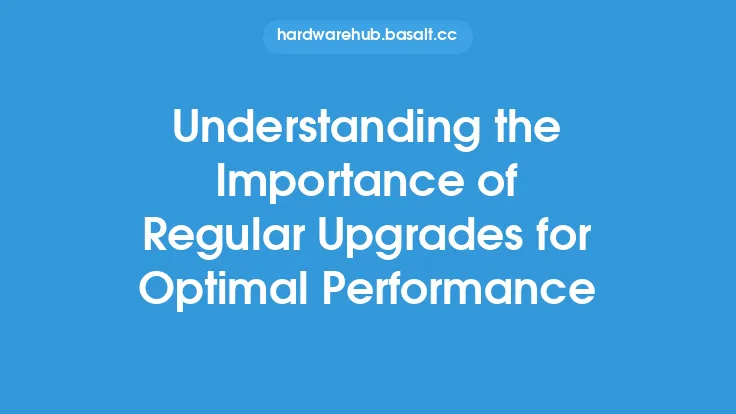Regular maintenance of your computer's storage devices is crucial to ensure optimal performance, prevent data loss, and prolong their lifespan. Storage devices, such as hard disk drives (HDDs), solid-state drives (SSDs), and flash drives, are essential components of modern computers, and their proper care is vital to maintain the overall health and efficiency of your system. In this article, we will delve into the importance of regularly cleaning and maintaining your computer's storage devices, exploring the benefits, best practices, and technical aspects of storage device maintenance.
Introduction to Storage Device Maintenance
Storage device maintenance involves a range of activities, including cleaning, updating, and optimizing your storage devices to ensure they function correctly and efficiently. Regular maintenance helps to prevent errors, crashes, and data loss, which can be catastrophic, especially for businesses and individuals who rely heavily on their computers. Moreover, proper maintenance can improve the overall performance of your system, reducing loading times, and enhancing your computing experience.
Benefits of Regular Storage Device Maintenance
Regular maintenance of your storage devices offers numerous benefits, including:
- Improved performance: Cleaning and optimizing your storage devices can significantly improve your system's performance, reducing loading times and enhancing overall efficiency.
- Data protection: Regular maintenance helps to prevent data loss and corruption, ensuring that your valuable files and documents are safe and accessible.
- Extended lifespan: Proper care and maintenance can prolong the lifespan of your storage devices, reducing the need for frequent replacements and minimizing downtime.
- Reduced errors: Maintenance helps to identify and fix errors, preventing crashes and system failures, which can be frustrating and time-consuming to resolve.
Types of Storage Device Maintenance
There are several types of storage device maintenance, including:
- Physical cleaning: Removing dust, dirt, and other debris from the exterior and interior of your storage devices to prevent overheating and damage.
- Software updates: Updating your storage device firmware and software to ensure compatibility, fix bugs, and improve performance.
- Disk cleanup: Removing temporary files, system files, and other data that can clutter your storage devices and reduce performance.
- Disk defragmentation: Rearranging data on your storage devices to improve access times and reduce fragmentation.
- Error checking: Scanning your storage devices for errors and bad sectors, which can help to prevent data loss and corruption.
Best Practices for Storage Device Maintenance
To ensure the optimal performance and longevity of your storage devices, follow these best practices:
- Regularly clean your storage devices, using compressed air or a soft brush to remove dust and debris.
- Update your storage device firmware and software regularly, to ensure compatibility and fix bugs.
- Use disk cleanup and defragmentation tools to optimize your storage devices and improve performance.
- Run error checking tools, such as Check Disk (chkdsk), to identify and fix errors and bad sectors.
- Use a reliable backup system, such as an external hard drive or cloud storage, to protect your data in case of a storage device failure.
Technical Aspects of Storage Device Maintenance
Storage device maintenance involves a range of technical aspects, including:
- Understanding the different types of storage devices, such as HDDs, SSDs, and flash drives, and their unique maintenance requirements.
- Familiarity with disk formatting and partitioning, which can affect performance and data storage.
- Knowledge of file systems, such as NTFS, HFS+, and ext4, which can impact data storage and retrieval.
- Understanding the role of disk buffers, cache, and other performance-enhancing features, which can improve storage device performance.
- Familiarity with storage device interfaces, such as SATA, PCIe, and USB, which can affect performance and compatibility.
Common Storage Device Maintenance Mistakes
When maintaining your storage devices, it's essential to avoid common mistakes, such as:
- Using excessive force or harsh chemicals when cleaning your storage devices, which can cause damage or corrosion.
- Updating firmware or software incorrectly, which can cause compatibility issues or system crashes.
- Ignoring error messages or warnings, which can lead to data loss or corruption.
- Failing to backup your data regularly, which can result in catastrophic data loss in case of a storage device failure.
- Using outdated or incompatible maintenance tools, which can cause more harm than good.
Conclusion
Regular maintenance of your computer's storage devices is crucial to ensure optimal performance, prevent data loss, and prolong their lifespan. By following best practices, understanding the technical aspects of storage device maintenance, and avoiding common mistakes, you can keep your storage devices in top condition, protecting your valuable data and ensuring a smooth computing experience. Remember, regular maintenance is essential to get the most out of your storage devices and to prevent costly repairs or replacements.
